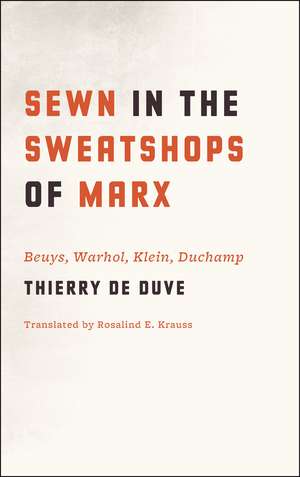Sewn in the Sweatshops of Marx: Beuys, Warhol, Klein, Duchamp
Autor Thierry de Duve Traducere de Rosalind E. Kraussen Limba Engleză Paperback – 15 oct 2012
Joseph Beuys, Andy Warhol, Yves Klein, and Marcel Duchamp form an unlikely quartet, but they each played a singular role in shaping a new avant-garde for the 1960s and beyond. Each of them staged brash, even shocking, events and produced works that challenged the way the mainstream art world operated and thought about itself.
Distinguished philosopher Thierry de Duve binds these artists through another connection: the mapping of the aesthetic field onto political economy. Karl Marx provides the red thread tying together these four beautifully written essays in which de Duve treats each artist as a distinct, characteristic figure in that mapping. He sees in Beuys, who imagined a new economic system where creativity, not money, was the true capital, the incarnation of the last of the proletarians; he carries forward Warhol’s desire to be a machine of mass production and draws the consequences for aesthetic theory; he calls Klein, who staked a claim on pictorial space as if it were a commodity, “The dead dealer”; and he reads Duchamp as the witty financier who holds the secret of artistic exchange value. Throughout, de Duve expresses his view that the mapping of the aesthetic field onto political economy is a phenomenon that should be seen as central to modernity in art. Even more, de Duve shows that Marx—though perhaps no longer the “Marxist” Marx of yore—can still help us resist the current disenchantment with modernity’s many unmet promises.
An intriguing look at these four influential artists, Sewn in the Sweatshops of Marx is an absorbing investigation into the many intertwined relationships between the economic and artistic realms.
Preț: 137.08 lei
Preț vechi: 175.25 lei
-22% Nou
Puncte Express: 206
Preț estimativ în valută:
26.23€ • 27.51$ • 21.87£
26.23€ • 27.51$ • 21.87£
Carte indisponibilă temporar
Doresc să fiu notificat când acest titlu va fi disponibil:
Se trimite...
Preluare comenzi: 021 569.72.76
Specificații
ISBN-13: 9780226922386
ISBN-10: 0226922383
Pagini: 96
Ilustrații: 35 halftones
Dimensiuni: 140 x 216 x 10 mm
Greutate: 0.18 kg
Editura: University of Chicago Press
Colecția University of Chicago Press
ISBN-10: 0226922383
Pagini: 96
Ilustrații: 35 halftones
Dimensiuni: 140 x 216 x 10 mm
Greutate: 0.18 kg
Editura: University of Chicago Press
Colecția University of Chicago Press
Notă biografică
Thierry de Duve is an art historian, critic, and curator. His publications in English include Kant after Duchampand Clement Greenberg Between the Lines. Rosalind E. Krauss is University Professor in the Department of Art History and Archaeology at Columbia University.
Cuprins
Preface 2009
Joseph Beuys, or The Last of the Proletarians
Andy Warhol, or The Machine Perfected
Yves Klein, or The Dead Dealer
Marcel Duchamp, or The Phynancier of Modern Life
Postface 2009
Recenzii
“Thierry de Duve’s is a crucial and utterly distinct voice in the field of modern art. Delightfully original and engaging, Sewn in the Sweatshops of Marx combines the author’s inimitably bold thinking with an unusual sensitivity to the ways that particular works articulate the convergence of aesthetics and economics. Its gorgeously constructed essays tell this art’s stories so well, they often read like the best biographical fiction.”
“That Beuys, Warhol, Klein, and Duchamp were variously engaged in rewriting the terms of production, circulation, and consumption of art, and did so by creating new work which challenged the received nature of the artwork is an oft-mentioned, oft-theorized fact. No one has gone so far in thinking through the dramatic intentions and achievements of these artists as de Duve, who in this free radical of a book, maps categories of political economy found in the pages of Marx onto their projects. De Duve’s recruitment of Marx is of such originality as to return the reader to Marx’s own texts, whose astonishing insights into production, mechanization, price, money, exchange value, the creativity of labor, and the innovation of markets have been neglected in recent times but demand reawakening. Written with verve, intricacy, and narrative fluency, this book probes and proves that these are the parameters in which the avant-gardes transact, and through which they must be brought to speech.”
“The book is a success at creating a visual and textual cartography, as following the red thread proves that you can indeed get there (political economy) from here (modern art/aesthetics) and vice versa. Likewise, the author provides fresh new perspective where the four artists and Marx are concerned. While many critics and authors have attempted to view modern and postmodern art through a similar lens, none have achieved such an enthralling and vivid image.”
